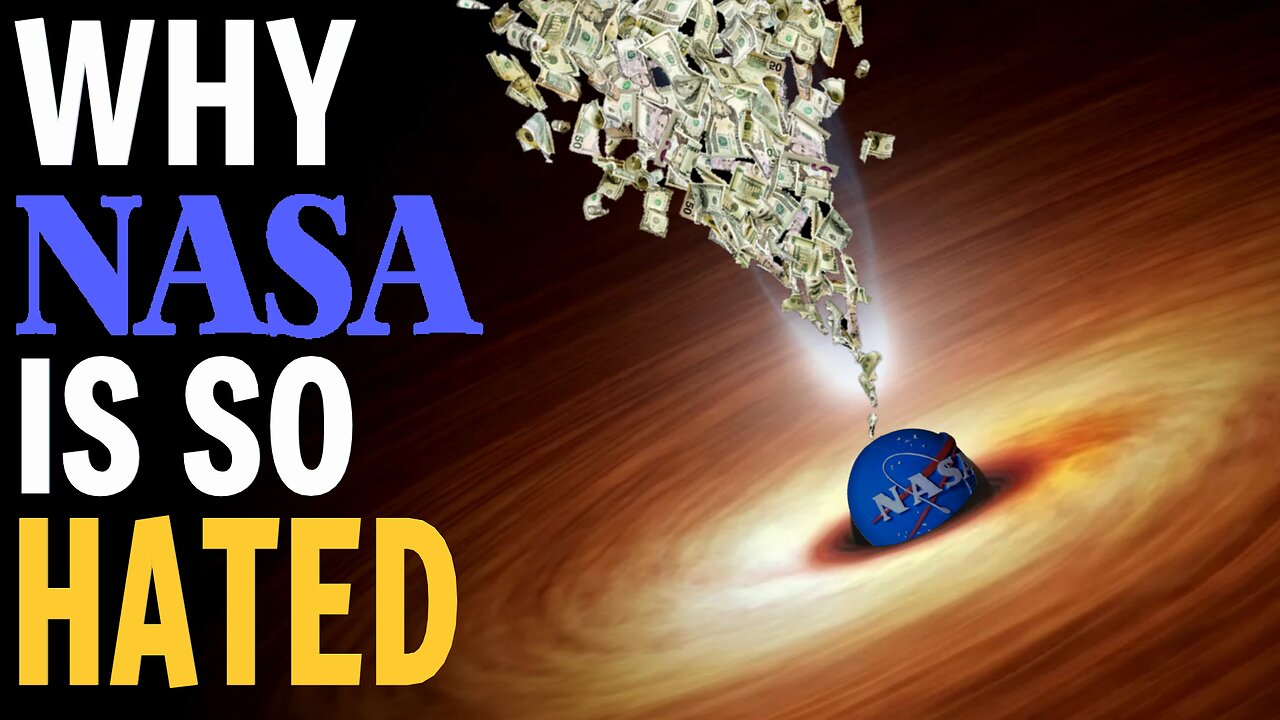Premium Only Content

Why Does Everyone HATE NASA? 😠
Please Support The RUMBLE Channel
50% of all support (after fees & tax) will go to a private Moon mission
RUMBLE Has More Videos & YOUR VIEWS Help Raise Money For a MOON Mission!
https://rumble.com/user/WhatsNextVids
Patreon:
https://www.patreon.com/user?u=37594401
Buy Me A Coffee?:
https://www.buymeacoffee.com/whats.next
Donate With Cash App:
https://cash.app/$YTpayments
Donations Updated Weekly on X/Twitter:
https://x.com/WhatsNe75388303
Why do so many people hate NASA?
NASA, the National Aeronautics and Space Administration, is an organization that has garnered significant admiration and support over the years for its groundbreaking achievements in space exploration, scientific research, technological advancements, and inspiring missions. However, like any large institution, NASA is not immune to criticism or negative sentiments from certain individuals or groups. The reasons why some people may harbor negative feelings towards NASA can vary and are often based on a combination of factors:
Budget Allocation: One common criticism of NASA is related to its budget allocation. Some individuals argue that the funds directed towards space exploration could be better utilized for addressing pressing issues on Earth such as poverty, healthcare, education, and environmental concerns. There is a perception that the money spent on space missions could be seen as extravagant or wasteful when there are urgent needs on our planet.
Lack of Immediate Benefits: Another reason for discontent towards NASA is the belief held by some that the outcomes of space exploration do not directly benefit them or have tangible impacts on their daily lives. While NASA’s research and innovations often lead to technological spinoffs that benefit society at large, these benefits may not always be immediately apparent to the general public.
Misinformation or Lack of Awareness: Negative attitudes towards NASA can also stem from misinformation or a lack of understanding about the agency’s goals, accomplishments, and contributions to society. Inaccurate portrayals in media or misconceptions about the relevance of space exploration can contribute to a negative perception of NASA.
Competing Priorities: In a world with numerous challenges and limited resources, some individuals may view investments in space exploration as taking away resources from other important areas such as healthcare, education, infrastructure, or social welfare programs. This perspective can lead to resentment towards organizations like NASA that receive substantial funding for their missions.
Political Ideologies: Criticism of NASA can also be influenced by political ideologies or beliefs. Some individuals may oppose government-funded agencies like NASA due to ideological differences regarding the role of government in funding scientific research and exploration.
Environmental Concerns: Certain environmental groups or activists may criticize space exploration activities for their potential impact on Earth’s environment. Launches and operations related to space missions can have environmental consequences such as carbon emissions and waste generation, leading to objections from those advocating for sustainability and conservation.
Perceived Lack of Transparency: Criticism towards NASA may also arise from concerns about transparency in decision-making processes, project management, or allocation of resources within the organization. Lack of clarity about how taxpayer dollars are being used or perceived inefficiencies in operations can contribute to negative perceptions.
In conclusion, while NASA enjoys widespread support and admiration for its contributions to science, technology, and human knowledge, there are various reasons why some individuals may hold negative views towards the agency. These reasons range from budgetary concerns and competing priorities to misinformation, lack of immediate benefits perceived by some members of the public.
-
 LIVE
LIVE
Spartan
3 hours agoBack from worlds. Need a short break from Halo, so single player games for now
39 watching -
 LIVE
LIVE
Eternal_Spartan
10 hours ago🟢 Eternal Spartan Plays FF7 Rebirth Episode 15 | USMC Veteran
57 watching -
 1:32:11
1:32:11
Tundra Tactical
2 hours ago $0.11 earnedProfessional Gun Nerd Plays Battlefield 6
167 -
 1:00:08
1:00:08
BonginoReport
4 hours agoDark Brandon Returns - Nightly Scroll w/ Hayley Caronia (Ep.164)
95.3K49 -
 49:24
49:24
Donald Trump Jr.
6 hours agoPeter Navarro Went to Prison So You Won't Have to | TRIGGERED Ep,286
44.2K41 -
 2:33:49
2:33:49
Nerdrotic
14 hours ago $2.01 earnedNerdrotic at Night 528
13K1 -
 LIVE
LIVE
xxTOWERDOGxx
2 hours ago👻🔪What's Your Favorite Scary Movie?👻🔪🟢Alienware Area 51🟢!discord🟢
19 watching -
 13:09:19
13:09:19
LFA TV
1 day agoLIVE & BREAKING NEWS! | MONDAY 10/27/25
203K40 -
 LIVE
LIVE
Kst0ne13
2 hours ago🔥1 day before the BF6 BR! Time to get ready!!
7 watching -
 LIVE
LIVE
ZWOGs
1 hour ago🔴LIVE IN 1440p! - Horror Games w/ The Brrrap Pack! - Come Hang Out!
23 watching